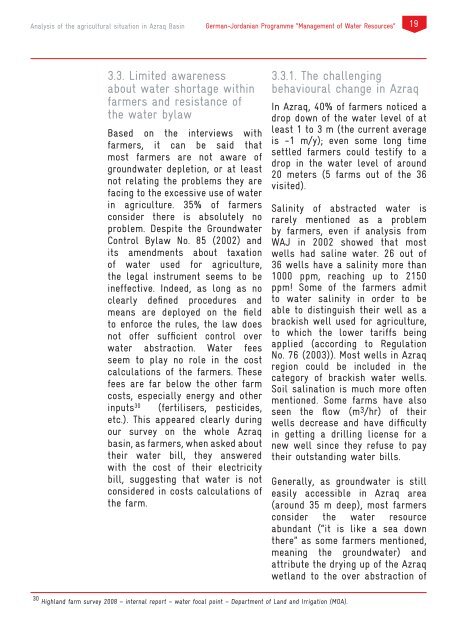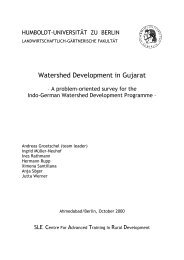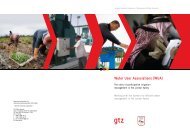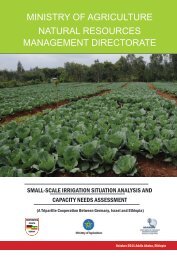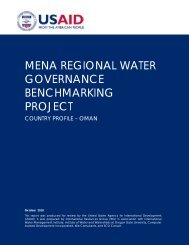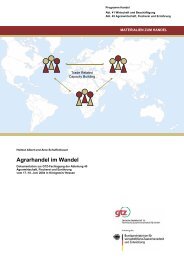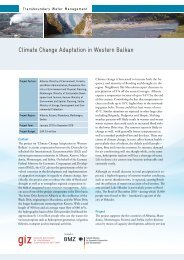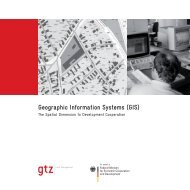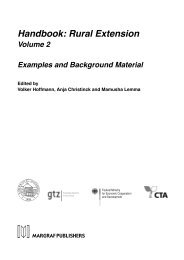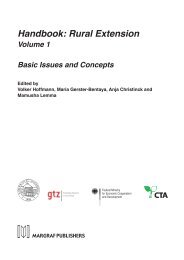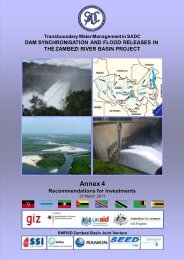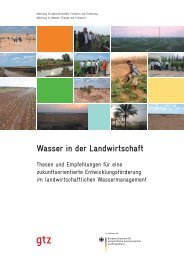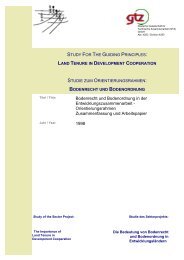Farming in the - WordPress.com
Farming in the - WordPress.com
Farming in the - WordPress.com
You also want an ePaper? Increase the reach of your titles
YUMPU automatically turns print PDFs into web optimized ePapers that Google loves.
Analysis of <strong>the</strong> agricultural situation <strong>in</strong> Azraq Bas<strong>in</strong><br />
German-Jordanian Programme “Management of Water Resources”<br />
19<br />
3.3. Limited awareness<br />
about water shortage with<strong>in</strong><br />
farmers and resistance of<br />
<strong>the</strong> water bylaw<br />
Based on <strong>the</strong> <strong>in</strong>terviews with<br />
farmers, it can be said that<br />
most farmers are not aware of<br />
groundwater depletion, or at least<br />
not relat<strong>in</strong>g <strong>the</strong> problems <strong>the</strong>y are<br />
fac<strong>in</strong>g to <strong>the</strong> excessive use of water<br />
<strong>in</strong> agriculture. 35% of farmers<br />
consider <strong>the</strong>re is absolutely no<br />
problem. Despite <strong>the</strong> Groundwater<br />
Control Bylaw No. 85 (2002) and<br />
its amendments about taxation<br />
of water used for agriculture,<br />
<strong>the</strong> legal <strong>in</strong>strument seems to be<br />
<strong>in</strong>effective. Indeed, as long as no<br />
clearly def<strong>in</strong>ed procedures and<br />
means are deployed on <strong>the</strong> field<br />
to enforce <strong>the</strong> rules, <strong>the</strong> law does<br />
not offer sufficient control over<br />
water abstraction. Water fees<br />
seem to play no role <strong>in</strong> <strong>the</strong> cost<br />
calculations of <strong>the</strong> farmers. These<br />
fees are far below <strong>the</strong> o<strong>the</strong>r farm<br />
costs, especially energy and o<strong>the</strong>r<br />
<strong>in</strong>puts 30 (fertilisers, pesticides,<br />
etc.). This appeared clearly dur<strong>in</strong>g<br />
our survey on <strong>the</strong> whole Azraq<br />
bas<strong>in</strong>, as farmers, when asked about<br />
<strong>the</strong>ir water bill, <strong>the</strong>y answered<br />
with <strong>the</strong> cost of <strong>the</strong>ir electricity<br />
bill, suggest<strong>in</strong>g that water is not<br />
considered <strong>in</strong> costs calculations of<br />
<strong>the</strong> farm.<br />
3.3.1. The challeng<strong>in</strong>g<br />
behavioural change <strong>in</strong> Azraq<br />
In Azraq, 40% of farmers noticed a<br />
drop down of <strong>the</strong> water level of at<br />
least 1 to 3 m (<strong>the</strong> current average<br />
is -1 m/y); even some long time<br />
settled farmers could testify to a<br />
drop <strong>in</strong> <strong>the</strong> water level of around<br />
20 meters (5 farms out of <strong>the</strong> 36<br />
visited).<br />
Sal<strong>in</strong>ity of abstracted water is<br />
rarely mentioned as a problem<br />
by farmers, even if analysis from<br />
WAJ <strong>in</strong> 2002 showed that most<br />
wells had sal<strong>in</strong>e water. 26 out of<br />
36 wells have a sal<strong>in</strong>ity more than<br />
1000 ppm, reach<strong>in</strong>g up to 2150<br />
ppm! Some of <strong>the</strong> farmers admit<br />
to water sal<strong>in</strong>ity <strong>in</strong> order to be<br />
able to dist<strong>in</strong>guish <strong>the</strong>ir well as a<br />
brackish well used for agriculture,<br />
to which <strong>the</strong> lower tariffs be<strong>in</strong>g<br />
applied (accord<strong>in</strong>g to Regulation<br />
No. 76 (2003)). Most wells <strong>in</strong> Azraq<br />
region could be <strong>in</strong>cluded <strong>in</strong> <strong>the</strong><br />
category of brackish water wells.<br />
Soil sal<strong>in</strong>ation is much more often<br />
mentioned. Some farms have also<br />
seen <strong>the</strong> flow (m 3 /hr) of <strong>the</strong>ir<br />
wells decrease and have difficulty<br />
<strong>in</strong> gett<strong>in</strong>g a drill<strong>in</strong>g license for a<br />
new well s<strong>in</strong>ce <strong>the</strong>y refuse to pay<br />
<strong>the</strong>ir outstand<strong>in</strong>g water bills.<br />
Generally, as groundwater is still<br />
easily accessible <strong>in</strong> Azraq area<br />
(around 35 m deep), most farmers<br />
consider <strong>the</strong> water resource<br />
abundant (“it is like a sea down<br />
<strong>the</strong>re” as some farmers mentioned,<br />
mean<strong>in</strong>g <strong>the</strong> groundwater) and<br />
attribute <strong>the</strong> dry<strong>in</strong>g up of <strong>the</strong> Azraq<br />
wetland to <strong>the</strong> over abstraction of<br />
30 Highland farm survey 2008 – <strong>in</strong>ternal report – water focal po<strong>in</strong>t – Department of Land and Irrigation (MOA).


